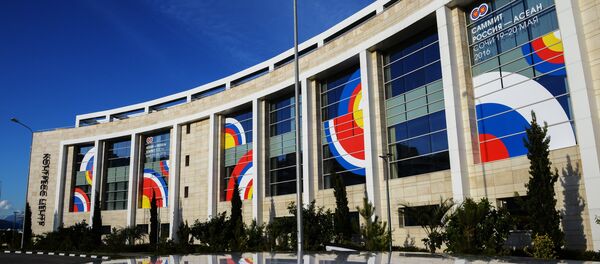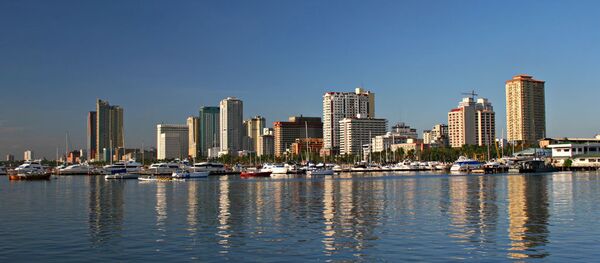The Russia-ASEAN dialogue partnership marks its 20th anniversary since its establishment this year. A Philippine delegation participated in the Russia-ASEAN summit aimed at boosting cooperation between Russia and the nations of the Asia-Pacific Region. How do you assess the results of the summit? What do you think the future hold for Russia-ASEAN relations?
Mario Montejo: The Commemorative Summit has affirmed that Russia is an important dialogue partner for ASEAN. The Summit showed that there is a strong political commitment for us to broaden and deepen cooperation, and that is reflected in the Sochi Declaration and the new ASEAN-Russia Plan of Action. We had very good and frank discussions on how ASEAN can expand trade and investment flows with Russia and the other countries of the Eurasian Economic Union.
We need to do more in cultivating business partnerships and the Philippines fully supports organizing more business summits, two-way business missions and investor briefings. ASEAN and Russia are clearly good friends but moving forward we need to improve awareness-raising about our respective complementarities.
In the Philippines, we have empowered our scientists, innovators and engineers to think outside of the box. With their inherent talents, creativity and capabilities, now we have local technology that works for the people. Our journey towards technology self-reliance has been hastened by partnering with our more developed neighbors. For this reason, the Philippines is keen to spearhead the creation of an ASEAN-Russia Network of Scientists and Researchers, which will draw together the brightest minds of government, academic research institutions and the private sector to pursue joint research and development.
According to Russian Deputy Foreign Minister Igor Morgulov, Russia places an emphasis on boosting cooperation with the Association in the areas of modernization and high-tech. Does the Philippines plan to take part in developing trade, economic, investment and tech cooperation between Russia and ASEAN?
Mario Montejo: As I had mentioned, the Philippines fully concurs that we need to focus collaboration on innovation and the adoption of new technologies. An important conduit will be the creation of the Philippine-led Network of ASEAN-Russia Scientists and Researchers and we are fully supportive of greater engagement of the private sector in ASEAN-Russia cooperation in energy, transport, tourism and agriculture.
Russia is a vast country and has done remarkably well in connecting its people through extensive air, land and rail links. The Philippines is developing a locally designed elevated train to improve connectivity and mass transportation.
Russia, for its part, has one of the largest rail systems in the world and is unique in that it has an extensive network of railway universities. This is just one area where Russia's engineering expertise could help ASEAN improve connectivity in Southeast Asia.
Similarly, I am convinced that the Philippines and the rest of ASEAN can benefit from Russia’s expertise in the fields of energy, public transportation, aerospace, and metallurgy.
Taking into account the current geopolitical situation, can you share your opinion on the prospects of linking regional integrational processes, including in the context of implementing the program of forming a broad economic partnership between the Eurasian Economic Union (EAEU), the Shanghai Cooperation Organization (SCO) and ASEAN?
Mario Montejo: Regional integration, especially those that are economic in nature, can be considered as one of the global “megatrends”. Everybody is doing it and for good reason. Economic integration has been proven to spur economic growth as it allows different countries to engage each other commercially within a system governed by mutually agreed-upon rules. It works by facilitating economic exchange while fostering trust and continuous dialogue.
The Philippines is a founding member of ASEAN and has benefited immensely from its active participation in this grouping’s initiatives across a wide range of areas. The challenge of maintaining high economic growth makes it imperative for the Philippines to diversify its economic partnerships. This, of course, includes strengthening trade and investment ties with Russia and the larger Eurasian Economic Union. This will of course entail a lot of groundwork from both ASEAN and the newly established EEU considering that Eurasia is virtually a new frontier for us. The Philippines will study the possibility and potential of this initiative.
I note that there is already an institutional linkage between the ASEAN Secretariat and SCO since 2005. This puts these two institutions in a good position to explore possibilities for practical cooperation on issues of common interest.
According to the International Monetary Fund (IMF), the Philippines is expected to have the fastest growth in gross domestic product (GDP) among the 5 biggest economies of the Association of Southeast Asian Nations in 2016. Do you think this puts Manila in a good position to become a hub for activities that connect Russia and Asia?
Mario Montejo: Yes, the country is experiencing sustained economic growth and we expect this to continue. For the last six years, the Philippines’ GDP has grown at an average of 6 percent each year while the world average was just about 3 percent.
We have received successive upgrades from all the major credit rating agencies including S&P, Moody’s and Fitch. At the moment, we are one of Asia's fastest growing economies. Because of the sustainability of our development and the favorable demographic circumstances we enjoy, many analysts predict that the Philippines will be one of the 20 largest economies by 2050.
The Philippines can offer Russian firms an excellent expansion location in Southeast Asia with a healthy investment climate. For instance, Russian IT firms can take advantage of the Philippines vast pool of talented and English-speaking manpower. High-level back-end processes such as business analytics and software development can be transferred to Manila for lower cost and greater efficiency.
Naumen, a Russian leader in BPO software solutions, has established a regional presence in the country in 2013 with the assistance of both PH and Russian Embassies. This can be followed by many more with a concerted effort by both governments.
After you visit to Sochi, you will travel to Moscow to meet with Russian officials from the Academy of Science and from the ministries related to science and technology sectors to exchange views on Russian-Philippine cooperation. What are the main areas of bilateral cooperation between Moscow and Manila in these fields? What are the prospects for expanding this cooperation?
Mario Montejo: That is correct. I am visiting the Russian Academy of Sciences to conduct exploratory talks on potential areas of cooperation in Science and Technology. I am a firm believer in developing local technology and using science to solve local problems. Therefore, we would like to initiate discussions on some of our priorities such as the use of Space Science and Technology for climate monitoring, disaster risk management and agricultural applications.
We are also interested in Materials Science, Energy Generation as well as Nano- and Bio-technology for health and food applications and Genomics.We look forward to discussing collaborative Research and Development and Capacity Building initiatives that are grounded on mutually-agreed principles.
How do you assess the current level of Russia’s investment in high-tech projects in the Philippines? Are there any measures that the Philippine government plans to introduce in the short-term to attract more Russian investments?
Mario Montejo: The Philippines welcomes Russia as an investment partner in the high-tech sector. The key is to expand first our cooperation through exchanges and collaborations in Science and Technology so that our experts may develop the necessary understanding of and interest in each other. This way, we will be in a better position to commercialize R&D results and reap the financial results of our work in S&T.




